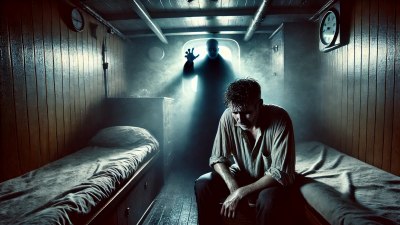The Weaving Shadows (Supernatural Mystery)
A chilling tale of spectral shadows and mysterious deaths unfolds as Chet Burke investigates an eerie attic room where reality and the supernatural collide
 W.H. Holmes
W.H. Holmes 
This image was created with the assistance of DALL·E
Chet Burke was lazily reclining in his favorite easy chair, absorbed in a rare book on alchemy and black magic, when his sister answered a summons at the door.
In addition to managing the household affairs of the apartment in which she and Burke lived alone, her duties also consisted of scrutinizing the many visitors. Most of them could be persuaded to call at the bookstall, which Burke conducted when not devoted to some criminal mystery that held him until it was solved. Others, whose cases were urgent, were admitted to the apartment, thus infringing on Burke’s only recreation: reading and study.
The visitors were Chief Rhyne, a friend of Burke’s, of the Rhyne Detective Agency, and a stranger.
Burke laid aside his book and greeted the callers with a friendly nod. Rhyne, a portly, flushed man, settled his sturdy body into a convenient chair. The stranger, an intelligent-looking man, appeared ill at ease. He stood self-consciously beside Rhyne, absently running the brim of his soft hat through browned, muscular-looking fingers.
“Burke,” grunted Rhyne heavily, “meet Mr. Hayden. He is bothered about a very mysterious affair. It has worked on his nerves until he has decided to consult an expert. It’s beyond me, so I brought him around to you.”
Rhyne sighed with relief and eased back in his chair.
Hayden stuck out a rough, calloused hand to Burke. His bronzed face flushed slightly at Rhyne’s statement.
“I am more concerned,” he said, in a surprisingly agreeable voice, “about how you will receive what I have to relate. I can hardly believe yet that the things exist, although I have seen them three nights in succession.”
He shook his head in doubt and sat down mechanically in the chair Burke drew up.
While Hayden was gathering his thoughts, Burke quietly sized him up. Hayden appeared to be a man of about forty-five. His face was deeply tanned, and his appearance suggested many hours spent outdoors. Burke noted at once his trait of meeting one’s gaze directly from warm brown eyes. He was garbed quietly, and evidently in his best. His dark suit was set off by square-toed shoes, above which glared white socks. A low, soft, white collar with a black string tie completed his obviously habitual concession to dress. On the whole, Hayden struck the detective as a wholesome type of practical mechanic.
“Now, Mr. Hayden,” said Burke musingly, his eyes half-closed and vacant, “state your case fully. We will try not to interrupt you.”
The detective lounged in his chair, his heavy lips slightly drooping, and his long legs crossed indolently in front of him. His eyes had their customary vague stare through the tortoise-shell glasses that veiled them.
Hayden drew a long breath, then exhaled it in a long sigh. With a brisk straightening of his shoulders, he said:
“I am a carpenter. Until recently, or, to be exact, until four days ago, I lived in New Orleans. I am a bachelor, and it doesn’t make much difference to me where I live, so long as I can find work at my trade. Therefore I came up here, to Sunken Mine, in the Highlands of the Hudson, to live with a widowed sister and her daughter.”
He paused, and his eyes grew reflective. For a moment he was evidently measuring his words. With a quick intake of his breath, he resumed:
“My sister lives in an aged, pre-Revolutionary house, deep in the mountains. It is a lonely place, a secluded dwelling. At one time, it was probably a restful, country farmhouse. Today, it is a weathered frame building, set in a grove of dead and whitened chestnut trees.
“The house is a one-story-and-attic affair, with rough stone fireplaces at the sides and a long, sloping roof that pitches low at the rear. Owing to its age and condition, it is a dreary spot for someone accustomed to city life. My sister prefers ancient, antique furnishings, which only adds to the impression of living in the past. As soon as I crossed the threshold, I was struck by a vague, misty remembrance of having been there before.
“It may strike you as strange that my sister chose such a place to spend her remaining days. But she and her daughter have compelling reasons. Both are earnest spiritualists, receiving messages and serving as sincere mediums. My sister believes that the atmosphere of the old dwelling aids in materializing those who have passed on. I, too, have some faith in such things, although I approach them practically. I believe only in what I see. And what I am about to recount, I have both seen and felt.”
Hayden paused for an instant, staring earnestly at Burke, who nodded for him to continue.
“I’ve always read deeply,” Hayden resumed, “and in my spare time, I might be called a bookworm. While I work at my trade, I live much in the past, particularly through books. For this reason, I can understand my sister’s desire to live close to her life’s hobby—or her ‘mission,’ as she calls it.
“There’s one more reason why my sister purchased the place six weeks ago: it was the original settlement of our family before the Revolution. Following a family tragedy more than a hundred years ago, the house passed into other hands. Few new buildings are constructed in that sparsely populated, infertile area, and most homes have stood for generations. Consequently, the old Hayden house remained intact. When it came back on the market, it was vacant and for sale.
“They had been living there for about two months when I arrived to stay with them. The room I occupied on Sunday night is on the second floor. It’s a semi-attic room, lit by a single window. Before I arrived, my niece used the room. After I came, it was arranged for me, and the girl and her mother moved into a bedroom downstairs.
“It was around eleven-thirty on Sunday night when I went to bed and quickly fell asleep. I awoke to the feeling of being stifled, as if a heavy cold made it difficult to breathe. This strange sensation of suffocation finally caused me to rouse completely. Once fully awake, the feeling subsided. Unable to fall asleep again, I lay looking out of the window at the stars. The bed is at the room’s far end, with the window directly in sight.
“The house was intensely quiet. I noticed this particularly, as I was unaccustomed to such silence after living in the city. There wasn’t so much as an insect stirring. My own breathing, which sounded hoarse and rasping in my ears, seemed to fill the room. It reminded me of a dying man, gasping for his last breath—a fancy that perplexed me, given my practical tendencies. Yet, in those moments before the phenomena began, my thoughts were inexplicably drawn to uncanny ideas. At the same time, I felt a strange tingling sensation throughout my body.
“As I lay staring at the faintly lit sky, I became aware of a peculiar illusion—or, as I sometimes believe, a startling visitation. The room’s shadows appeared to dance rapidly before my eyes. They streamed in long wreaths, coiled into fantastic spirals, and wafted through the room in wide, level films of blackness.
“I don’t know how I was able to see this, but it was unmistakable. Although the room was dark except for faint moonlight filtering through the clear sky, these moving shadows were distinctly visible due to their greater density. I can only compare this uncanny motion to swaying clouds of tobacco smoke, drifting slowly and freely.
“For several moments, I watched the shadows’ movements. Then, I noticed them forming into more stable shapes. They coiled into long, horizontal layers of blackness that twisted rapidly. For a while, they remained motionless except for their spinning motion. Suddenly, as if stirred by a firm breeze, they began undulating toward the head of the stairs. This drift caused several layers to touch and weave together into huge, rolling shapes, which swiftly streamed down the stairs. As they disappeared, the room seemed to grow lighter, the air clearer. The stifling sensation left me entirely.
“I lay there quietly, pondering this strange phenomenon. So far, I was more curious than frightened. But the possibility of the shadows’ return filled me with apprehension and suspense.”
“My eyes were gazing absently out of the window, as I had not turned my eyes from the stairs after the black rolls had streamed down them. Slowly—so slowly that it scarcely seemed to move—I saw a black, humanlike form rise above the sill of the window. I could just see the top of it as it mounted the stairs. I watched it with a keen realization that it had something to do with the shadows.
“Very slowly, almost imperceptibly, the round, headlike shape continued to rise. I could now see it plainly, outlined against the lighter sky. The shape rose to its full height. It had the form of a shapeless human figure—that is, I could distinguish the smaller head shadow above, and what would answer for a body, if one were at all imaginative. The thing passed beyond the window and drifted into the darkness at the end of the room. Yet, I could still make out its vague form by its greater blackness.
“My eyes went back to the window. Another figure was slowly blocking the cheerful light of the sky. Again, a black form emerged to its full height. It joined the first. I am not a coward. I lay quiet, wondering what the thing presaged.
“The two figures advanced to the center of the room. They were now fairly discernible. One of them walked to an old-fashioned dresser at one side of the room, stood there a moment, then joined the other figure. With this, both shapes turned and passed down the stairs.
“As they were disappearing, I called out. The forms were so clear, and I was by this time so far from sleep, that my mind hit on a logical reason to explain the thing. It was evidently my sister and my niece. They had wanted something from the dresser, and, not wishing to disturb me, had come up quietly, gotten what they wanted, and then returned to their room.
“Getting no answer to my call, I sprang out of bed to convince myself of the truth of my belief. I went downstairs to their room. Both were in bed and fast asleep. I woke them. Neither one had been up since retiring. I did not tell them of the black forms but made some excuse for awakening them. The remainder of the night I spent in the kitchen, sleeping in a large rocking chair.”
Hayden paused and stared at Burke.
“Go on,” said Burke shortly. “This would not have brought you to me.”
Hayden shook his head. “No,” he said, “it was what came after. This same night, as I arose from the bed, following the disappearance of the two forms down the stairway, I had reached the center of the room when I became conscious of standing in something wet beneath my feet. I was barefoot, and when I looked down, I found my feet soiled with blood.
“Naturally, I thought I had cut myself, but a close examination revealed no cut or bruise of any sort. I lit a lamp and went back upstairs. My first glance was at the spot where I had first felt the wetness. A glance revealed the cause. Directly in the center of the bare board floor was a large pool of fresh blood. It was slowly spreading out over the floor, sinking into the dry wood. I cleaned it up as much as possible and then searched the room thoroughly. There was absolutely nothing I could find to explain the blood.
“The next morning, both my sister and my niece complained of feeling languid and fatigued. My niece, a very pale and frail girl, was even more colorless than usual. Her mother, with her deep, intense eyes and the black rings that encircle them, seemed listless and indifferent to everything. Noting this, I scrubbed up the bloodstains before they could make up the room and said nothing about what I had seen.
“Things were normal until Monday night. Again, about the same hour, I was awakened by a smothering sensation. Once more, I heard my own breathing as I gasped for air. As I became more fully awake, the smothering sensation grew even more intense. I sat up in bed, crouched over like one suffering from asthma, and struggled to fill my lungs with air. But this did not relieve my distress.
“Unconsciously, my eyes were fixed across the dark room. Again occurred the weaving of the shadows. Panting, stifling, and seemingly unable to arouse myself enough to get out of bed, I watched the repetition of the scene from the previous night. Once the horizontal streams of shadows were formed, my breathing became more normal, and I seemed to regain the power to move and think clearly.
“I then deliberately waited to see the finish of the affair. The banks of twisting shadows disappeared down the stairway, and the two figures repeated their previous trip. As soon as they had descended past the window, I sprang from bed and lit my lamp. My eyes went immediately to the floor. The pool of fresh blood was there for the second time. I let it lay and tiptoed downstairs to the women’s room. Both were in a sound sleep, but I was struck immediately by the haggardness of their features.
“I did not wake them. Getting a basin and water, I returned upstairs. I scrubbed the floor again, this time with much care, as the stain had now gone deep into the aged boards. Leaving the lamp lit, I went back to bed. Finally, I fell asleep. Nothing occurred during the remainder of the night.
“The morning after this second visitation,” resumed Hayden, “I again noticed the extreme pallor of my niece and the haggard, gaunt face of her mother. Still, I remained silent, determined to solve the riddle for myself.
“Last night I retired early and took several precautions. First, I secured an electric flashlight. Next, I powdered the stairs with flour. I also sprinkled flour on the attic room’s floor. I now had a trap that no human being—or any mechanical figure—could tread over without leaving a trace. This done, I blew out the lamp and went to bed.
“I lay awake for two or three hours. I was determined to stay awake until the shadows began to form or until I started to feel the smothering sensation. In this way, I would have a grasp of the phenomenon from start to finish. But despite my resolution, I fell asleep.
“I was again awakened by an uncanny feeling. Firm hands—or, rather, some peculiar force—seemed to hold my arms down on the bed. I tried to draw up my legs to slip out of bed but found them held by an unyielding power. Finally, I discovered that I was unable to move any part of my body. I was certainly awake, yet I was as helpless as a person in a nightmare, who imagines that their body is totally paralyzed.
“Forced to lay motionless, I saw the black shadows stream from various parts of the room. This time, they formed over my bed. I could feel them drift across my face, spinning, waving, twisting, and contorting. It was an unearthly feeling—lying there, helpless to avert whatever might happen. There is nothing I can describe to compare to the sensation of those black forms, ceaselessly in motion. It might be likened to an invisible force pressing on one, or to a heavy fog that seems physically tangible, with an impression of dampness and chill.
“This helplessness and the weaving of the shadows went on for about five minutes. Then, as the twisting rolls started to stream down the stairs, I felt my body regaining its power. With the disappearance of the materializing forms, I became physically and mentally myself again.
“I then grabbed the electric torch, ready to flash it at the proper moment. The figures rose above the stairs, and I directed the beam of light toward them. I waited until they advanced to the center of the room, then I threw on the light.”
Hayden wiped his mouth with a trembling hand. His lips were dry, and his face flushed.
Then, with a slight shudder, he went on:
“At the instant of the flash, the darkness of the figures was gone. Instead, I saw two faces. They were inhuman, horrible, and impossible to describe. They leered at me with their shadowy, devilish faces, scarcely discernible in the glow of the torch. They seemed to be mocking me. They were corpse-like and repulsive, but their eyes were the most terrible feature. They were full and real, glowing with a hellish, vengeful fire. But with all the horribleness of the faces, it was not they that held me motionless.
“It was at that moment that I discovered the source of the blood. It was dripping out of the air, falling in a steady patter. I glanced up at the ceiling, but it was firm and unbroken. While I watched—it was scarcely a second—the drops seemed to form in the air above the floor. They were rapidly ceasing when my nerves gave way for a moment, and I let out an involuntary yell. With the cry, the dripping blood suddenly ceased, and the faces vanished.
“This brought me to my senses. I sprang from bed, determined to see the thing through. My first act was to scan my trap. I followed the flour down the stairs, but it lay in a white, unbroken dust, just as I had scattered it. That night, also, I looked in on the women. Both were sound asleep. But I was deeply shocked by their distorted faces. Shaken both mentally and bodily, I once more spent the rest of the night in the kitchen rocker.
“And now I want someone to go up there with me, examine the house, and spend the night in the room. I am troubled, nervous, and frightened—for myself and for those with whom I live.”
“I will go there with you,” replied Burke evenly, “and I think the two of us should accomplish something. We can probably handle two shadowy forms.”
Hayden smiled dolefully. “They handled me last night,” he said ruefully. “I’m a pretty strong man, but something held me as helpless as a baby.”
Burke alighted at a lonely way station, standing on a strip of land between a wide marsh and the Hudson.
The marsh stretched to the foot of the mountains, lying sear and rippling in the September breeze. Hayden had stated that the dwelling stood back in the hills, a distance of some five miles. On Burke’s suggestion, they started to walk. Burke wanted to study the country and, incidentally, study his companion.
The country he found to be sparsely settled. The road wound up through forest-clad rocky hills. The dwelling stood beside a wide stretch of woods, with cleared fields to the north.
Burke scanned the dwelling as he approached it and found it to be the usual type of farmhouse of a century ago, buried among dead trees.
The interior of the house was in keeping with the exterior. Oval frames held old prints; horsehair-upholstered, massive dark furniture contrasted with tables and stands covered with white marble tops. The chairs squatted grimly in the quiet rooms, resting on dull rag carpets. The woman and her daughter struck Burke as beings transported from the misty past.
The mother was a tall, sparse woman with heavy black rings about her eyes. Her black, dreamy eyes held Burke with a steady, unwinking stare. The daughter was the opposite of her dark, sallow mother. She seemed a lifeless, colorless sprite, seemingly alive by the power and vigor of her more intense mother. She was about twenty years of age, although her chalky face, thin bloodless hands, and slight frame gave her the appearance of an older woman or someone suffering from a wasting disease. Both were of the dreaming, musing type, speaking softly and briefly, moving silently about the quiet house, and garbed in white dresses.
Burke’s first act was to visit the room upstairs. There was nothing to warrant his attention except the stained floor. He ripped up several splinters and put them in his pocket. He then announced his intention of visiting the nearest town, several miles to the south.
Hayden asked no questions, evidently placing the affair entirely in Burke’s hands. He remarked that he would “walk down a ways” with the detective and await his return.
The two women were still unaware of Burke’s vocation and accepted without comment Hayden’s statement that Burke was a friend who was to remain overnight.
*
As soon as Burke arrived in town, he went directly to the Chief of Police. There, he inquired about someone qualified to examine the bloodstained splinters. He was directed to a doctor who maintained a laboratory. After a lengthy analysis, the doctor confessed his puzzlement. Something was missing in the composition. He could not account for the peculiar results he obtained. It was human blood—and yet, it was not.
Burke returned to the Chief of Police and asked about the Haydens. The Chief, unable to provide much information, directed Burke to an old settler in the vicinity who might furnish the desired details.
Burke found the family without trouble. They were willing to talk, but they knew very little about the Haydens—though they shared a good deal about the house.
Over a hundred years ago, they explained, a widow and her niece had lived in the then-new dwelling. The place was a flourishing farm, managed by the widow’s step-brother. The family was reclusive and seldom seen.
Weeks passed, and the community noticed that the two women were nowhere to be found. The brother, living alone in the house, refused to talk. This led to an investigation. However, no trace of the women was ever discovered. The brother was never brought to trial. He continued to live on the property until his death from old age, prospering throughout his life. His heirs inherited the place, but over time, the farm was gradually divided and sold off, leaving only the house and an acre of land.
Burke listened politely and, after thanking the old couple, returned to the Hayden house. Hayden was awaiting his arrival.
That evening, Burke sat by the open fireplace, listening to the low, earnest conversation of the others. He observed the woman and her daughter closely. They seemed consumed by a restless emotion, causing them to wander aimlessly about. In contrast, Hayden appeared sluggish and incapable of sustained speech. This struck Burke as odd, given the vividness of Hayden’s earlier account of the attic room.
At ten o’clock, the women announced their intention of retiring. Bidding the two men goodnight, they withdrew to their rooms. Burke and Hayden, the latter nearly listless and dull in his movements, climbed the narrow stairs to the room above.
Both lay on the bed, fully dressed. Burke watched as Hayden pulled a revolver from his pocket and slid it under his pillow.
“What shall we do?” asked Hayden heavily, his gaze unfocused and his tone devoid of energy.
“Well,” Burke replied quietly, “first, we will blow out the lamp.”
He rose from the bed and extinguished the light. Returning, he crawled onto the far side of the bed, leaving Hayden on the outer edge. Burke had no desire to find himself on the receiving end of the revolver should Hayden start shooting.
The detective lay for an hour, pondering the strange case. Finally, he spoke to Hayden. The latter did not reply. He appeared to be fast asleep. Yet, as Burke listened closely, he could discern no signs of breathing.
Burke began to experience a singular emotion, stirred by the intense silence of the room. The longer he lay, the more oppressive it became. Downstairs, he heard the low chime of a clock. It struck eleven. The minutes dragged on in forbidding quiet.
The clock chimed the half-hour. Fifteen more minutes passed. Hayden, breathing heavily now, began to stir. Burke half rose on his elbow, listening. Hayden muttered incoherently in his sleep.
Burke watched the dark shadows of the room with keen eyes. Nothing moved. He glanced at the window—nothing there. Hayden appeared to be suffering, gasping for breath.
The detective was on the verge of shaking him awake when, with a heavy, prolonged gasp, Hayden sat up. Burke sensed the horror gripping the man yet remained motionless. Hayden's wide eyes wandered frequently to the window, fixed on something unseen.
Nothing unusual was visible, but Burke kept his eyes on Hayden. The latter sat rigidly, struggling with the weight on his chest, his breathing labored. Then, to Burke’s amazement, Hayden began to breathe normally again.
“Burke,” Hayden whispered hoarsely, “did you see it? Did you see them pass down the stairs?”
“Eh?” Burke muttered, feigning sleepiness.
“My God!” Hayden exclaimed. “You were supposed to watch, and you fell asleep! They’ve gone down the stairs. They’ll come back again in four or five minutes. Watch!”
Burke remained silent. Together, they stared intently at the window. Suddenly, Hayden stiffened.
“The head is just coming up the stairs!” Hayden whispered.
Burke felt the movement as Hayden’s arm slid under his pillow. Then came the blinding flash of a revolver and its deafening roar. Hayden fired twice. By the time Burke switched on his electric torch, the room was empty. Burke scanned the floor. No blood was visible.
Hayden panted heavily, rocking back and forth.
“I feel awful queer,” he groaned. “Something is dragging me.”
Mechanically, Hayden rose from the bed and stumbled to the floor.
“It tells me to kill, kill! Kill with my revolver. Kill—who shall I kill?”
Burke followed silently as Hayden moved toward the stairs with slow, deliberate steps. With measured precision, Hayden descended the stairs, and Burke trailed close behind.
Hayden led the way directly to his sister and niece’s room. Without hesitation, he grasped a loaded billy. Burke remained nearby, ready for the moment he might need to intervene.
Hayden appeared oblivious to the light cast by Burke’s torch. He didn’t falter on the short journey. Reaching the side of the bed where the women slept, he paused and stared down rigidly.
Burke joined him. His light fell on the two women. What he saw stunned him—their faces were contorted in horrific agony.
A sudden premonition gripped Burke. He bent down to touch the girl’s hand—it was limp and lifeless. Checking the pulse of the elder woman, he confirmed the grim truth.
Both were dead.
The detective turned to Hayden.
Hayden stood motionless, staring down at the lifeless forms with dry eyes.
“I see,” he murmured stupidly. “Both dead. Kill, kill—who was I to kill? Not them. They’re dead. Something still tells me to kill!” He sank into a chair and buried his face in his hands.
Burke lit a lamp on a heavy dresser and extinguished his torch. He stood looking down at the two women. Slowly, he noticed that the room was growing shadowy. He glanced at the lamp—it was full of oil, and the wick burned steadily, yet the light continued to dim.
Burke turned his gaze back to the women. Slowly, almost imperceptibly, their agonized features seemed to relax, taking on the repose of death.
Hayden rose and came to Burke’s side. He was muttering softly, barely coherent. Burke watched him closely.
Suddenly, Hayden started, his eyes darting across the room.
“They’re coming back!” he mumbled, “weaving and twisting.”
His eyes tracked something invisible, moving across the room, finally resting on the women’s faces.
“Streaming down their mouths!” he muttered. “They’re sucking in the twisting rolls. They’re coming to life!”
Burke glanced at the women. In the dim light, he could have sworn he saw faint traces of returning life. At that moment, a crashing gunshot erupted beside him, followed by a blinding flash.
With the shot, the lamp flared brightly, illuminating the room. The dead faces of the women remained still, peaceful in death. Burke turned quickly.
Hayden was collapsing to the floor, a bullet hole in his head. Blood slowly emerged from the wound. Burke knelt beside him, lifting the man’s head.
Slowly, Hayden’s heavy form relaxed. His eyes opened briefly, bewildered as they locked with Burke’s.
Then, he was gone.
Burke laid Hayden’s body gently on the floor and returned to the bed. Once more, he checked for a pulse in the women’s still forms. Both were undeniably lifeless. Yet, this time, their faces bore a peaceful expression. On the elder woman’s slightly parted lips, an exultant smile seemed to linger.
After closing the room, Burke gathered his coat and belongings, then locked up the house. Hours later, he recounted the tragedy to the Chief of Police. The Chief drove Burke to the county Sheriff, and together they returned to the house. The Sheriff had summoned the coroner, who awaited their arrival.
A brief examination of the women revealed that both had died of heart failure, likely brought on by some unexplainable shock. Burke then conferred privately with the Sheriff. On Burke’s suggestion, they conducted a thorough search of the attic room, determined to locate the source of the dripping blood.
At the end of the search, the mystery was laid to rest—for Burke. But to his friend Rhyne, he would later confess his failure.
Returning to his New York apartment, Burke found Rhyne waiting for him.
“Well,” Rhyne exclaimed, “did you solve the mystery?”
“No,” Burke replied. “I did not.”
Rhyne’s eyes widened. “Well—what did you find?”
“Over the attic room,” Burke said musingly, “we found a small, crypt-like space between the ceiling of the attic room and the roof of the house. It was encased in plaster. When we broke through the ceiling, a mass of human bones tumbled down. The coroner identified them as the skeletons of a woman and a girl. Both had been dead for generations.”
He paused, his voice heavy with finality.
“Through the shoulder blade of the girl’s skeleton was a jagged hole. When the bones fell, the elder woman’s skull rolled to my feet. I picked it up. Something rattled inside. I worked it out through the eye socket. It was a slug of lead.”
Burke leaned back, his face etched with somber reflection.
“Both the woman and the girl had been murdered.”
🙃
This story is part of "Weird Tales, Volume 1, Number 1, March 1923: The unique magazine" edited by Edwin Baird. Read all the stories from this enchanting collection here >>> Weird Tales!
✍✍✍
The story you've just experienced is a work of fiction, a creation of the imagination meant to entertain, provoke thought, and inspire. From the heart-fluttering highs of love stories to the spine-tingling chills of horror, these stories are unbound by the mundane. Whether you're in the mood for a quick escape or a deep dive into fantastical realms, explore the place where imagination echoes beyond the ordinary - Echoes of Imagination!

















